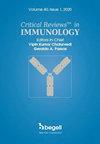microRNA-99b通过靶向mTOR信号通路调控calmette - guerin感染的未成熟树突状细胞诱导的CD4 T细胞分化
IF 0.9
4区 医学
Q4 IMMUNOLOGY
引用次数: 0
摘要
目的:本研究旨在阐明microRNA-99b (miR-99b)调控卡介苗(Bacillus Calmette-Guerin, BCG)感染的未成熟树突状细胞(imDCs)诱导CD4 T细胞分化的机制。方法:采用bcg感染的imdc诱导CD4 T细胞分化。评估miR-99b、干扰素-γ (IFN-γ)、Foxp3、白细胞介素(IL)-10、IL-17、IL-23和ROR-γt的水平。研究miR-99b抑制和雷帕霉素(mTOR)激动剂的机制靶点对Th17/Treg细胞比例和细胞因子(IL-6、IL-17、IL-23)水平的影响。分析与miR-99b相关的mTOR、S6K1、4E-BP1的表达。结果:bcg感染的imdc导致CD4 T细胞分化,IFN-γ、Foxp3、IL-10、miR-99b、IL-17、IL-23和ROR-γ T水平改变。抑制miR-99b可提高与bcg感染的imdc共培养的CD4 T细胞中Th17/Treg细胞比例,mTOR激动剂可进一步增强这一作用。此外,当CD4 T细胞与bcg感染的imdc共培养时,miR-99b抑制剂升高了IL-6、IL-17和IL-23的水平,mTOR激动剂进一步放大了这种升高。值得注意的是,miR-99b负向调节mTOR信号,因为miR-99b抑制剂上调mTOR、S6K1和4E-BP1的表达水平,同时降低miR-99b。结论:miR-99b通过mTOR途径调节CD4 T细胞分化,以应对bcg感染的imdc。抑制miR-99b会影响Th17/Treg比率和促炎细胞因子,可能影响结核病的免疫治疗。本文章由计算机程序翻译,如有差异,请以英文原文为准。
microRNA-99b regulates Bacillus Calmette-Guerin-infected immature dendritic cell-induced CD4 T cell differentiation by targeting mTOR signaling
Objective: This study aimed to elucidate the mechanisms by which microRNA-99b (miR-99b) regulates CD4 T cell differentiation induced by Bacillus Calmette-Guerin (BCG)-infected immature dendritic cells (imDCs). Methods: BCG-infected imDCs were employed to induce CD4 T cell differentiation. Levels of miR-99b, interferon-gamma (IFN-γ), Foxp3, interleukin (IL)-10, IL-17, IL-23, and ROR-γt were assessed. Effects of miR-99b inhibition and mechanistic target of rapamycin (mTOR) agonist on Th17/Treg cell ratio and cytokine levels (IL-6, IL-17, IL-23) were studied. Expression of mTOR, S6K1, and 4E-BP1 related to miR-99b was analyzed. Results: BCG-infected imDCs led to CD4 T cell differentiation and altered levels of IFN-γ, Foxp3, IL-10, miR-99b, IL-17, IL-23, and ROR-γt. Inhibition of miR-99b increased the Th17/Treg cell ratio in CD4 T cells co-cultured with BCG-infected imDCs, and this effect was further enhanced by the mTOR agonist. Additionally, the miR-99b inhibitor elevated the levels of IL-6, IL-17, and IL-23 when CD4 T cells were co-cultured with BCG-infected imDCs, and the mTOR agonist further amplified this increase. Notably, miR-99b negatively regulated mTOR signaling, as the miR-99b inhibitor upregulated the expression levels of mTOR, S6K1, and 4E-BP1 while decreasing miR-99b. Conclusion: miR-99b modulates CD4 T cell differentiation via mTOR pathway in response to BCG-infected imDCs. Inhibiting miR-99b affects Th17/Treg ratio and pro-inflammatory cytokines, potentially impacting tuberculosis immunotherapies.
求助全文
通过发布文献求助,成功后即可免费获取论文全文。
去求助
来源期刊
CiteScore
2.60
自引率
0.00%
发文量
14
审稿时长
>12 weeks
期刊介绍:
Immunology covers a broad spectrum of investigations at the genes, molecular, cellular, organ and system levels to reveal defense mechanisms against pathogens as well as protection against tumors and autoimmune diseases. The great advances in immunology in recent years make this field one of the most dynamic and rapidly growing in medical sciences. Critical ReviewsTM in Immunology (CRI) seeks to present a balanced overview of contemporary adaptive and innate immune responses related to autoimmunity, tumor, microbe, transplantation, neuroimmunology, immune regulation and immunotherapy from basic to translational aspects in health and disease. The articles that appear in CRI are mostly obtained by invitations to active investigators. But the journal will also consider proposals from the scientific community. Interested investigators should send their inquiries to the editor before submitting a manuscript.

 求助内容:
求助内容: 应助结果提醒方式:
应助结果提醒方式:


